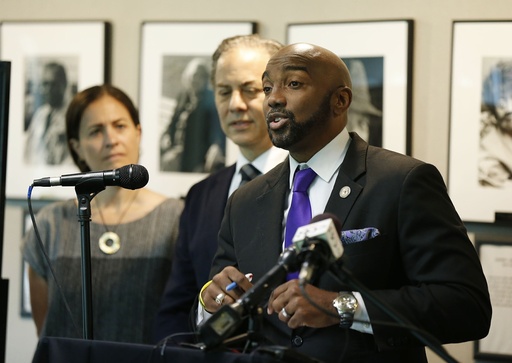On Tuesday, Tulsa’s newly elected mayor expressed his support for enhancing assistance to the victims of the 1921 Tulsa Race Massacre and their descendants, although he refrained from detailing specific measures the city might undertake regarding this tragic event, considered one of the most severe racial atrocities in U.S. history.
Monroe Nichols, who made history as the first Black mayor of Oklahoma’s second-largest city in November, publicly endorsed numerous key elements of a comprehensive proposal known as Project Greenwood. This initiative is named after the historically vibrant Black district that was devastated by a white mob during the massacre.
Led by survivors and descendants of the massacre, Project Greenwood aims to force the city to take financial responsibility after their appeal to the Oklahoma Supreme Court was denied last year. The violent incident resulted in the deaths of as many as 300 Black residents and forced many survivors into internment camps managed by the National Guard.
Included in the proposals under Project Greenwood are financial reparations for two centenarian women who are recognized as the last known survivors of this historical tragedy. Additional requests involve establishing a scholarship fund for the descendants of victims and designating June 1 as an official city holiday.
In his statement, Nichols expressed enthusiasm about partnering with Justice for Greenwood and various stakeholders to implement significant aspects of the plan. He promised to provide a comprehensive framework in the upcoming weeks outlining how his administration plans to address the enduring wounds left by the massacre and to foster a more cohesive and thriving Tulsa for all its residents.
A spokesperson for the mayor indicated that he was not available for further inquiries. Earlier in January, a report from the Justice Department, released during the latter part of the Biden administration, concluded that there would be no further criminal prosecutions related to the massacre.
On the other hand, responses from members of the Tulsa City Council were not immediately forthcoming on Tuesday.
Brian Crain, a Tulsa attorney and former state senator, showed support for creating memorials and allocating funds for a cultural center in the Greenwood area. However, he noted that fostering broad public support for other aspects of the proposal could be challenging. “Most of my discussions with fellow Tulsans rarely touch on financial reparations for an event that occurred a century ago,” he remarked.
The proposals also encompass establishing preferential hiring and contracting programs for descendants, providing tax and utility exemptions for them, and conducting a thorough audit of the land the city owns in the historic Greenwood district to assess its acquisition.
Despite the importance of the issue, the last two surviving individuals from the massacre, Lessie Benningfield Randle and Viola Fletcher, were not in attendance at a press conference in Tulsa that called for city support regarding the proposal. The initiative has been championed by attorney Damario Solomon-Simmons, who emphasized that it would be an unimaginable injustice for these two women, at the age of 110, to pass away without receiving the justice they rightfully deserve.



